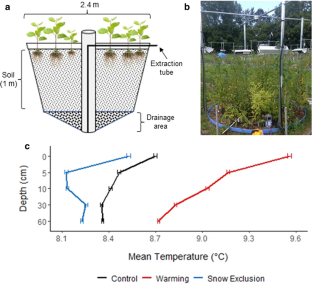"Potentially large biogeochemical responses to climate change are strongly mediated by soil characteristics."
Soil Types Influence Forest Nutrient Loss Under Climate Change
Posted: February 21, 2026

Nutrients like nitrogen and phosphorus are essential for forest health, supporting tree growth and ecosystem functions. They play a key role in processes such as photosynthesis and nutrient cycling, which are vital for maintaining healthy forests. Changes in nutrient levels can significantly affect how forests respond to environmental stresses, including those induced by climate change.
A 2022 study titled "Soil type modifies the impacts of warming and snow exclusion on leachate carbon and nutrient losses" examined how soil characteristics affect nutrient losses from forests under climate change. The authors conducted a field experiment with warming and snow exclusion treatments on two different soil types in forest sapling setups.
They found that "nutrient loss responses to warming and snow exclusion treatments frequently varied substantially by soil type." For example, warming and snow exclusion increased nitrogen losses on fine-textured soils but had no impact on coarse-textured soils. Coarse-textured soils had higher nutrient losses overall, except for phosphate, which had consistently higher losses from finer-textured soils.
The ability of saplings to mitigate nutrient loss depended on soil type and the specific nutrient involved. The authors suggest that "potentially large biogeochemical responses to climate change are strongly mediated by soil characteristics," highlighting the need to consider soil properties in climate models. Incorporating soil characteristics into climate projections may improve predictions of nutrient cycling and inform strategies for managing forest ecosystems under climate change.
Read "Soil type modifies the impacts of warming and snow exclusion on leachate carbon and nutrient losses"

 Big Data
Big Data